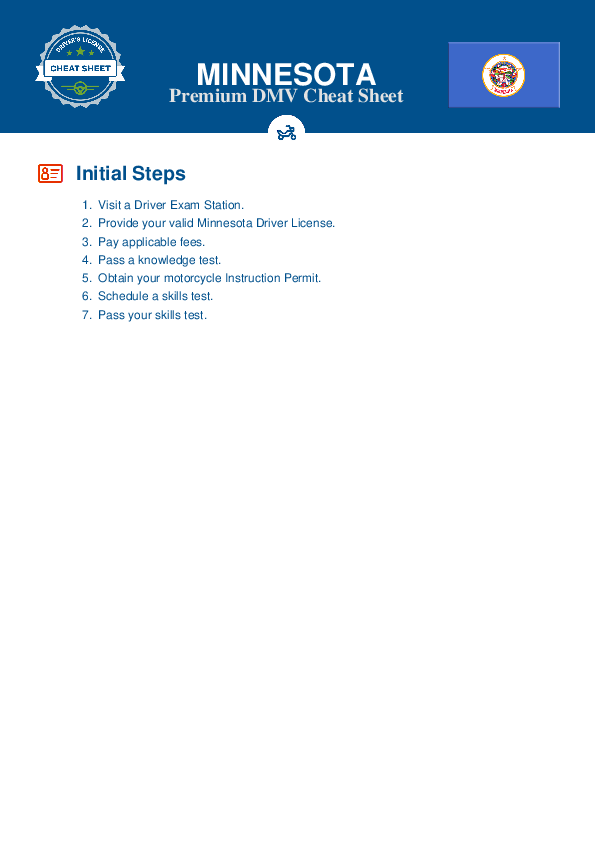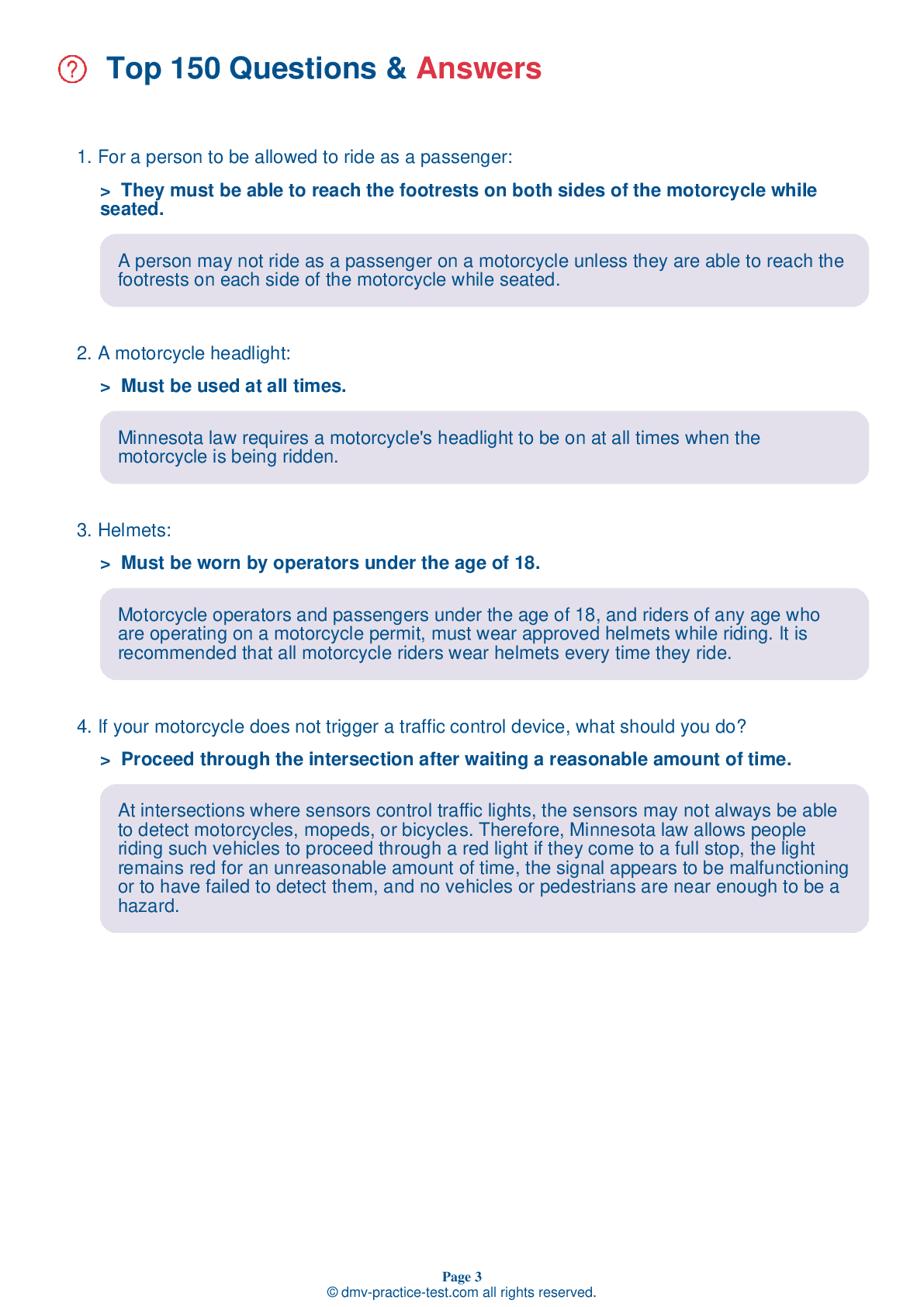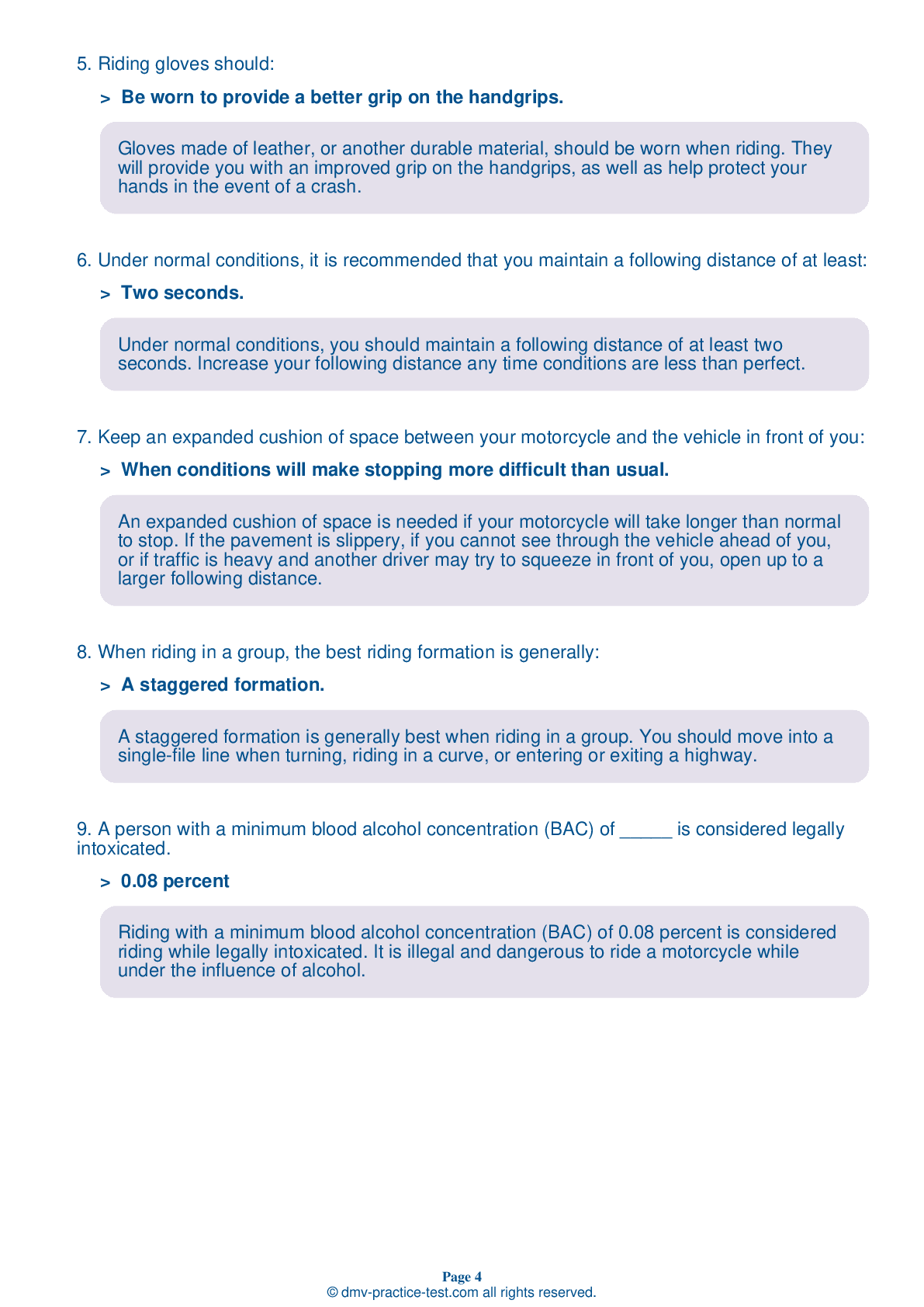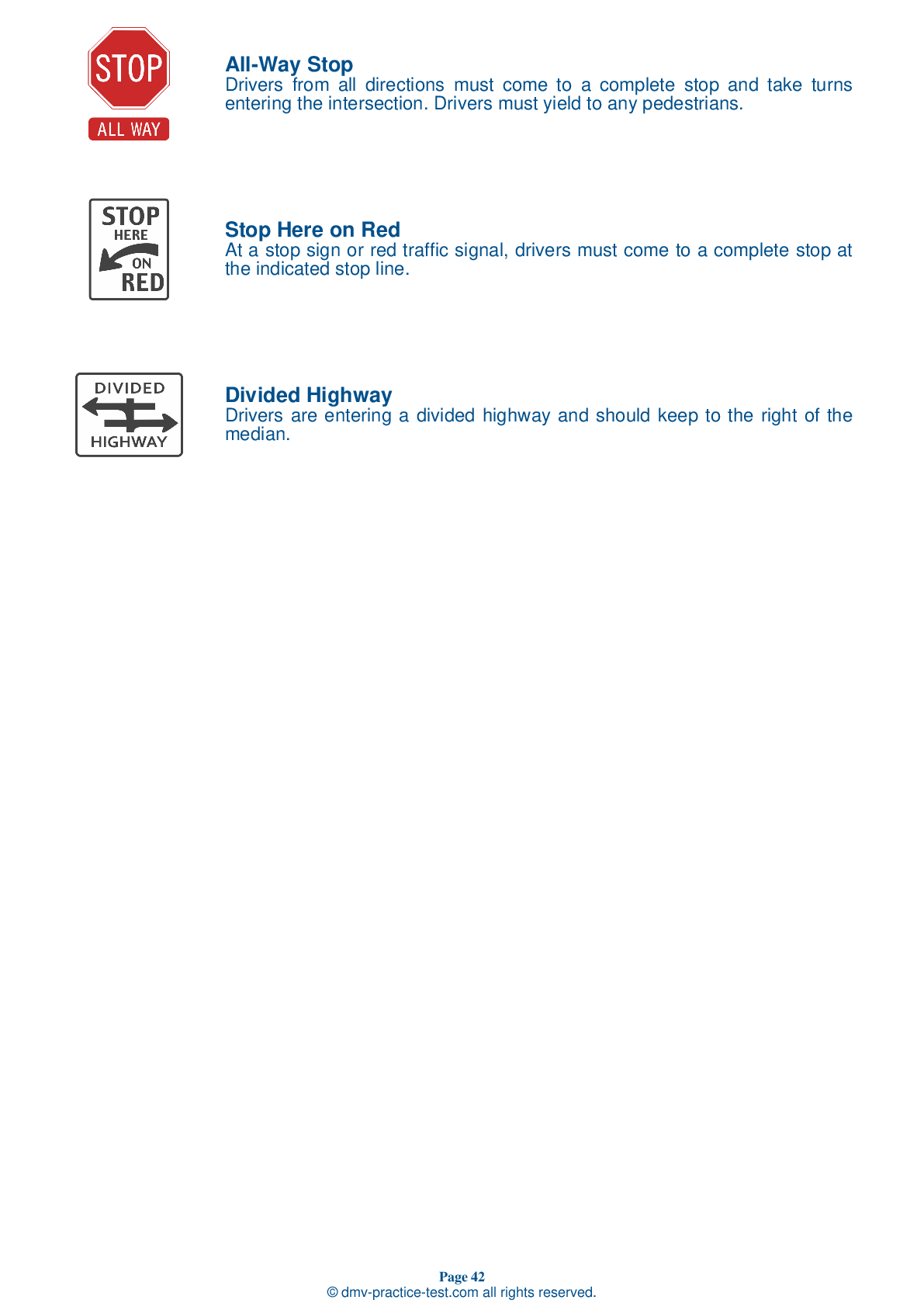DMV Permit Test #7
Motorcycle Test | License MN 2026 | FREE Online Practice! #7
Take this FREE motorcycle test (license in MN 2026) to check your knowledge of the road rules. To improve your results, download a motorcycle handbook online, study theory, and practice for free on our website. Still worried about how to get a motorcycle license in Minnesota in 2026? Check our website for more sample tests, train as much as possible, and boost your grades!
40
32
16
1 . Refusing to take an alcohol level test when it is requested by an officer:
Is a good idea.
By riding on Minnesota's roads, you automatically consent to take a test determining your blood alcohol concentration (BAC) when requested to do so by an officer. Refusing this test can result in a license suspension for up to six years.
2 . Before changing lanes, you should:
Speed up to get ahead of other vehicles.
Motorcycles have blind spots, just like any other vehicle. You should always turn your head to check for traffic in your blind spot before changing lanes. Do not rely on your mirrors alone.
3 . When approaching railroad tracks that cross your lane at an angle, it is usually:
Safest to cross the tracks by riding on the shoulder of the road.
When approaching railroad tracks that cross your lane at an angle, it is best to simply cross the tracks while riding straight within your lane. Turning to cross the tracks at a 90-degree angle could be dangerous because you could end up crossing into another lane of traffic.
4 . If you must stop quickly in a curve, you should:
Apply only the front brake.
If you must stop quickly while in a curve, you should first straighten and square the handlebars, then stop. If straightening your motorcycle is not possible, you should apply the brakes smoothly and gradually, reduce your lean angle, then increase the brake pressure as you slow down.
5 . As you accelerate, you should:
Remain in a neutral gear.
As your motorcycle increases speed, you will need to shift up into higher gears. Shift up well before the engine RPM reaches its maximum recommended speed. As a general rule, shift up soon enough to avoid over-revving the engine, but not so soon that you will cause the engine to lug.
6 . When riding at night, you should do all of the following, except:
Ride only in the left portion of your lane.
When riding at night, use your high beam (unless you are following or meeting another car), take advantage of the headlights of other vehicles, and wear reflective materials to increase your visibility. You should always be flexible about your lane position, selecting whichever position will help you to see, be seen, and have an adequate space cushion.
7 . Scan the road ______ ahead of your motorcycle.
Three seconds
Search your path of travel at least 12 seconds ahead of your motorcycle. This will allow you to see and react to hazards before meeting them.
8 . If you accidentally lock your rear wheel while braking on a good traction surface, you should:
Release the rear brake and down shift.
If you accidentally lock the rear brake on a good traction surface, keep it locked until you have completely stopped. Even with a locked rear wheel, you should still be able to control your motorcycle if it is upright and traveling in a straight line.
2026 Minnesota | Frequently Asked Questions
To acquire a motorcycle driver's license in Minnesota, you must first obtain a motorcycle instruction permit. This requires passing a written exam. After gaining experience, you can apply for a motorcycle endorsement on your driver's license. This involves passing both a skills test and an on-road test. You must also pay the necessary fees.
In Minnesota, the minimum age to obtain a motorcycle permit is 16 years old. However, if you're under 18, you must also have a valid driver's license, complete a state-approved motorcycle safety course, and hold your motorcycle instruction permit for at least six months before you can get a motorcycle endorsement on your license.
Yes, you do. In Minnesota, a dedicated motorcycle endorsement is required to legally operate a motorcycle. This endorsement can be added to your existing driver's license after passing a written test and a road test. If you are a new rider, you may also need to complete a state-approved motorcycle safety course.
To apply for a motorcycle driver's license in Minnesota, you'll need several documents: proof of identity (like a birth certificate or passport), your Social Security number, proof of residency in Minnesota, and if applicable, your current driver's license. If you're under 18, you'll also need a parent or guardian's signature on your application form.
Yes, you will need to take a written exam to get a motorcycle license in Minnesota. This test ensures you understand the rules of the road, safe riding practices, and Minnesota's specific motorcycle laws. If you successfully complete a state-approved motorcycle safety course, the riding skills test can be waived, but the written exam is still required.
The written test for a motorcycle license in Minnesota covers a variety of subjects related to motorcycle operation and safety. Topics include traffic laws, road signs, safe riding techniques, handling dangerous situations, and understanding motorcycle equipment. The test is designed to ensure riders are knowledgeable about the rules of the road and can operate a motorcycle safely.
In Minnesota, completion of a state-approved motorcycle safety course can waive the written and skills test required for a motorcycle endorsement. The course includes classroom instruction and hands-on riding exercises. Upon successful completion, you'll receive a certificate which you can present at the DMV to obtain your endorsement, bypassing the standard tests.
Enrolling in a motorcycle training course in Minnesota involves finding a state-approved training school, signing up for a suitable course, and paying the necessary fees. Courses typically include classroom instruction and hands-on riding practice. After completing the course, you will receive a certificate which can be used to waive the skills test when applying for a motorcycle endorsement.
No, you don't need to own a motorcycle to take the license test in Minnesota. You can use any street-legal, insured motorcycle that you're comfortable operating. However, it must meet all safety standards and be appropriately sized for you. The key is to ensure you're familiar with the motorcycle's operation before taking the test.
Yes, you can use a friend's motorcycle for the Minnesota motorcycle license road test, provided the motorcycle is legally registered, insured, and passes a basic safety inspection. Remember, you must also have a valid motorcycle permit to legally ride the motorcycle to the testing location.
Yes, in Minnesota, the motorcycle skills test evaluates your ability to handle a motorcycle, including starting, accelerating, turning and braking. It also assesses your ability to handle hazardous situations such as swerving and quick stops. The test ensures you can safely operate a motorcycle under various traffic conditions.
Yes, in Minnesota, new motorcycle drivers under the age of 18 must first obtain a motorcycle instruction permit. This permit carries several restrictions: they cannot ride at night, carry passengers, or ride on interstates. After a minimum of six months and reaching 17 years of age, they can apply for a full endorsement.
Yes, your Minnesota motorcycle license is valid across the United States. It's recognized by all states under the Full Faith and Credit Clause of the U.S. Constitution. However, when riding out of state, you must abide by the traffic and motorcycle laws of that particular state, which may differ from Minnesota's.
In Minnesota, motorcycle helmet laws are partial, meaning they apply to certain riders. All riders under the age of 18 and those with a learner's permit, regardless of age, must wear a helmet. For those 18 and older with a full license, wearing a helmet is optional but highly recommended for safety.
In Minnesota, there are two types of motorcycle licenses: the motorcycle endorsement and the motorcycle-only license. The motorcycle endorsement can be added to a regular driver's license, while the motorcycle-only license is for those who only want to operate motorcycles. Both require a knowledge test, skills test, and vision screening.
Yes, you can add supplementary endorsements to your motorcycle license in Minnesota. These might include a school bus endorsement or a commercial vehicle endorsement. Each endorsement requires passing additional written and skills tests. Always check with the Minnesota Department of Public Safety for specific requirements.
Yes, the motorcycle license test in Minnesota is available in several languages other than English. These include Spanish, Hmong, Vietnamese, Russian, and Somali. If you need the test in a language that isn't provided, you can request an oral test or use an interpreter.
An effective strategy to prepare for the Minnesota motorcycle license test is to study the state's Motorcycle and Motorized Bicycle Manual thoroughly. The manual covers all the information needed for the test. Additionally, taking practice tests available online can also be beneficial as they help familiarize you with the format and type of questions on the actual test.
Yes, the motorcycle written exam in Minnesota is available in several languages other than English. These include Spanish, Hmong, Vietnamese, Russian, and Somali. If you need the test in a language that is not provided, you can request an oral test or use an interpreter.
If you fail the motorcycle written test in Minnesota, you are allowed to retake it. However, you must wait until the next day to do so. There is no limit to the number of times you can retake the test, but each attempt will require a new fee. It's advisable to study thoroughly before reattempting.



